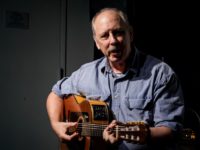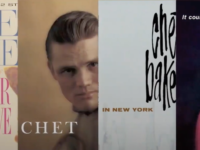Some might see the acoustic guitar as an apparatus for playing folk, blues, soft rock, and anything that’s smooth and gentle. Duck Baker prefers to see it as an instrument of limitless possibilities. Sure, Duck might have started out playing those predictable styles of music when he embarked on a career built around the unamplified six-string, but eventually his love for music both vintage and cutting edge inspired him to take the acoustic guitar to places it was never intended to be.
Readers of this space already figured that out when we made hay earlier this year about his solo acoustic guitar exploration of free jazz Everything That Rises Must Converge. Baker oriented himself more toward roots of all kinds with two more 2009 releases The Roots & Branches of American Music and The Waltz Lesson. And now, for his fourth release in what has been a prolific year for Mr. Baker, he returns to the boundless world of improvised music. Only this time, he’s not going solo, he’s enlisted the help of his friends. Which friends, you ask?
How about John Zorn, Cyro Baptista, Roswell Rudd and the late Derek Bailey? That’s what I’m talkin’ about, folks, a who’s who of whack jazz dignitaries. Put these guys in a room, let them jam without a script, and musical magic is certainly bound to occur. That’s the main allure of The Ducks Palace.
Although the release is new, the recordings are not. Not that this matters, since they are “new to us.” Culled from recordings Baker had in his possession ranging from 1993 to 2004, this collection puts Baker in three entirely different settings over seven performances, nearly all of them extemporaneously composed pieces. Despite the differing musical partners over several years, it’s the unconditionally free nature of these performances and the respect the musicians have for each other that gives The Ducks Palace its coherency.
It starts in 1993 with saxophonist John Zorn. Zorn has long been the king of improvised music in New York, but Baker’s association with him goes back to around the beginning of his storied career, around 1978. In Zorn, Baker found a kindred spirit, a fellow appreciater of the under-appreciated jazz forward-thinkers like Herbie Nichols, Sonny Clark and Hal McCusick. Baker was in town sixteen years ago, so Zorn set up a gig for Baker. With Zorn (and percussionist Cyro Baptista) on the bill, it was certain to draw a crowd. Based on these two improv pieces—the only recordings of Baker with Zorn—the crowd got what they came for.
On “Improv 1,” Zorn is just killin’ it on his alto, blending lush lazy lines trace all the back to Lester Young with rapid-fire and intense deliveries that I wouldn’t know was humanly possible if it wasn’t for Zorn. Baptista wrings out the right tonalities from his percussion kit, evoking the African moods of Ellington and primal grooves that’s fueled by instinct, not timekeeping. For his part, Baker sets up puzzles for Zorn to solve and negotiates the middle ground between the saxophonist and percussionist. With Zorn, one must be a great listener, and Baker shows he’s got the big ears to do it. “Improv 5” boasts the same great rapport, but for this performance, the three start quietly, creating some wide spaces between notes in the middle of the song, and then gradually turn up the intensity knob toward the end. When the song ends around the twelve minute mark, the crowd responds with raucous enthusiasm.
Baker’s 2002 home recordings with late Derek Bailey at Bailey’s house are likewise his only recordings with the father of free form guitar, but the two have had impromptu jams on several other occasions. That’s apparent from the affinity between the two revealed on these three tracks. They anticipate each others moves so well on “Improv 2” that it throws off the illusion of a single man with four arms playing a guitar. There’s more of the same in store on “Improv 4” and “Improv 6,” with the former featuring some delightful noteless explorations of sounds…plucking, thumping and atonal runs.
Duck’s third collaboration for this compilation was with the famed avant garde trombonist Roswell Rudd. Baker has been a longtime fan of Rudd’s and his connection to him can be found in the tendency of both to pay heavy tribute to jazz tradition while simultaneously pushing the idiom to its outer limits. The tradition-mindedness of Baker is brought out by Rudd more than the other colleagues who played on this album through two separate live performances in 2002 and 2004. “The Blues” begins as free improv with the two mixing in quotes from vintage tunes with the word “blues” in their title (Django Reinhardt’s “Limehouse Blues” is conjured up, for instance) before eventually settling into all blues. Baker’s signature fingerstyle approach is a natural for the relaxed, vintage blues style that emerges, and Rudd sassy style puts the pizazz on it. The second selection from this duo is another blues, “Pavement Blues,” a relatively brief, 1920’s styled number which is played “straight” and with a light swing that Baker has down pat. Recalling Jelly Roll Morton, a tip of the hat to the seminal jazz pianist comes at the end with Rudd shouting a phrase first heard on Morton’s “Sidewalk Blues.” A fitting ending to look back eighty years within an album that celebrates acoustic jazz at the outer fringes.
With just a humble acoustic guitar and some assistance from some of the best improvised music makers in the business, Duck Baker can make some scary good sounds.
The Ducks Palace comes to us courtesy of London-based Incus Records, and is available stateside via CD Baby.
Purchase: Duck Baker – The Ducks Palace




